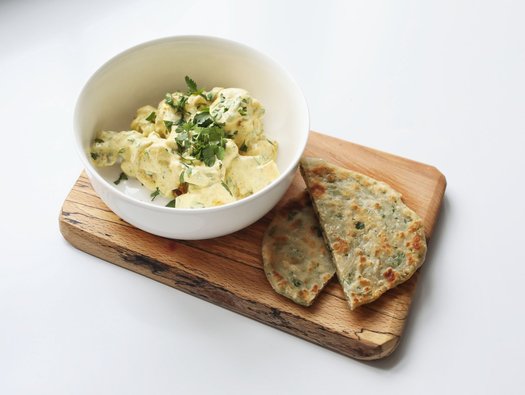Coronation cauliflower

A plant-based low protein recipe, low in salt, potassium and phosphate - great if you’re following a low protein diet.

A plant-based low protein recipe, low in salt, potassium and phosphate - great if you’re following a low protein diet.
1 large (up to 850g) cauliflower, separated into florets
2 tablespoons medium curry powder
1 tablespoon olive oil
250g soya yoghurt
20g sultanas
20g coriander, chopped
100g rocket, or other salad leaves
200g plain flour
20g parsley, chopped
100ml water
2 tablespoons olive oil
Up to 1 tablespoon of oil to cook the flatbreads
Add the cauliflower to a saucepan and fill with water, bring to a boil and allow to boil for 3 minutes so it is still fairly firm. Drain and allow to cool slightly. Preheat the oven to 200°C / 180°C fan / gas mark 6. Put the cauliflower into a roasting tin and toss with two teaspoons of the curry powder and one tablespoon of the olive oil. Roast for 20 minutes.
While the cauliflower is cooking, mix the yoghurt with the rest of curry powder, sultanas, and half of the chopped coriander.
Remove the cauliflower from the oven and leave to cool for a little while. Once cooled, mix into the yoghurt mix.
To make the flatbreads, put the flour and parsley into a bowl and mix in the water. Add in the oil, mix to a dough, and then knead for five minutes.
Divide the dough into four pieces and roll it out on a floured surface. Heat a small amount of oil in a large frying pan and cook each flatbread for about two minutes on each side. Keep warm in a clean tea towel until ready to serve.
Serve the cauliflower, sprinkled with remaining coriander, with a flatbread and some salad leaves like rocket.
The flour used to make the flatbread is the main source of carbohydrate in this recipe, and the value has been provided for those who have been trained in insulin adjustment.
This recipe is low in potassium, despite the use of a whole cauli-flower that has been baked rather than boiled. This is because the quantities of all the ingredients have been kept to a minimum, therefore please ensure you follow the quantities for all the ingredients and the serving sizes.
This recipe is also low in phosphate, however it still contains some phosphate, therefore, if you are prescribed a phosphate binder you should take as directed.
This recipe is low in protein, which makes it suitable for those advised to eat a reduced protein diet.
Use gluten-free flour for the flatbreads.
Consider using a wholemeal flour or half wholemeal and half white flour for the flatbreads.
This meal will keep in an airtight container in the fridge for three days. It is a great option for a packed lunch. Uncooked flatbreads can be frozen, layered with greaseproof paper, and then cooked from frozen. Cooking them from frozen will take a few minutes more.
Cooking without salt doesn’t mean bland meals. There are plenty of ingredients that give your cooking a flavour boost without reaching for the saltshaker. We’ve checked with kidney dietitians so you don’t have to worry about the science – or compromise on fantastic flavour.
You can enjoy a wide variety of delicious and healthy food when you are living with kidney disease. All Kidney Kitchen recipes are analysed and approved by kidney dietitians. Search through our kidney-friendly recipes or filter them by category below.
This plant-based, low protein recipe is low in salt, potassium and phosphate – great if you’ve been advised to reduce your protein.
By giving us your email address, you're giving us permission to send you the latest news from Kidney Care UK. Further information about how we protect and use your personal data is available in our Privacy policy. If you would like to change the way we communicate with you at any time please email [email protected]. You can unsubscribe at any time by using the link at the bottom of every email we send.